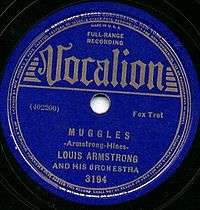Muggles (recording)

"Muggles" is the title of a recording by Louis Armstrong and His Orchestra.
Development
It was recorded in Chicago on December 7, 1928. The title refers to the use of the word "muggles" as a slang term for marijuana amongst jazz musicians of the 1920s and 1930s. Armstrong was an enthusiastic user of marijuana, which was legal in most American states at the time.
The personnel of this recording were, in addition to Armstrong on trumpet, Fred Robinson, trombone; Jimmy Strong, clarinet; Earl Hines, piano; Mancy Carr (not "Cara" as his name has often been misspelled) on banjo, and Zutty Singleton on drums.
"Muggles" is in the 12-bar blues form. It starts out with some rather modernistic Hines piano work for the time with Singleton playing sensitively on the brushes. Robinson then takes a gutsy lead without breaking the mood, followed by a chorus by Strong showing the influence of Jimmie Noone. The rest of the band then stops for 2 measures while Armstrong starts a chorus on an adventuresome break subtly playing with the rhythm. The horns then play chords behind Armstrong's excellent 2 choruses of solo. The rhythm gently suggests double-time on the first chorus, giving a sense of acceleration without actually speeding up the tempo, then returns to the dreamy feel of the tune's beginning for the final chorus, with Hines creating fills behind Armstrong.
This was the only side issued from the recording session that day. It is one of the last four sides Armstrong made before moving to New York City where, while he remained magnificent, especially without Hines (who had been his musical director in Chicago), the bands backing him up were often less interesting, and he switched from recording original compositions to covering popular songs.
"Muggles" is regarded as one of Armstrong's masterpieces. It was originally issued on Okeh 8703, a 78 RPM disc in Okeh's race record series. The recording has been reissued numerous times, and is available on compact disc. "Muggles" has been covered by later jazz musicians, including Nicholas Payton.